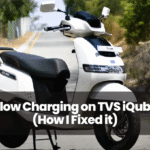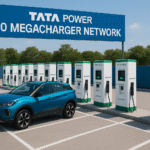Policy update benefits thousands of EV buyers; over 3,80,000 EVs already registered in Maharashtra.
In a historic decision towards speeding up electric vehicle (EV) adoption, the Maharashtra government has decided to abolish the 6% luxury tax on electric vehicles. The tax waiver, which is set to take effect from April 1, 2025, is a significant push towards promoting green mobility, in addition to reducing vehicle emissions across the state.
This update is expected to affect the airport traffic price of EVs under this policy, especially premium models, thus making them available to a broader range of consumers.
This announcement addresses years of concern from both EV manufacturers and consumers who care about the environment. So far, EVs priced in the upper bracket comprise vehicles like electric SUVs and luxury sedans, which were considered the same level as luxury IC vehicles.
The 6% luxury tax imposed under Section 6(3) of the Maharashtra Motor Vehicles Tax Act, 1958, had constituted a significant barrier to affordability, especially in the premium and performance EV segments.
Maharashtra Leading the Charge
The Maharashtra Transport Department has put up data regarding the registrations of over 36.39 lakh EVs comprising two-wheelers, three-wheelers, passenger vehicles, and commercial vehicles.
Maharashtra continues to be one of the best-performing states when it comes to EV adoption, along with the likes of Delhi, Karnataka, and Tamil Nadu. Furthermore, the elimination of the luxury tax in August is expected to push registrations even further upwards in the months to follow, according to industry experts.
The governance change will help lure more urban customers in cities like Mumbai, Pune, Nagpur, Thane, and Nashik, where the trend for green means has already taken off. In these urban centers, skyrocketing fuel costs, rising environmental awareness, and an improving charging network are driving consumers towards EVs.
A Win for Automakers and Buyers
This announcement will be a win-win situation for Indian automotive manufacturers such as Tata Motors, Mahindra Electric, and MG Motor, and also global players like Hyundai, BYD, Mercedes-Benz, and BMW, who are aggressively growing their electric portfolio in India. The policy strengthens the EV value proposition by reducing the entry price for those looking to buy premium electric cars.
Dealers have reported an immediate uptick in customer inquiries after the announcement. According to a dealer in Mumbai, customers who were postponing the electrification because of higher OD are now reconsidering it.
Welcoming the decision, the Federation of Automobile Dealers Associations (FADA) said, “This will democratize EV (electric vehicle) ownership and further build momentum towards India’s electrification goals.”
Reinforcing EV Policy Goals
The waiver of the luxury tax is in line with Maharashtra’s EV Policy 2021, which aims for EVs to account for 10 per cent of new vehicle registrations by 2025. Other provisions under this policy are favorable for early adopters, subsidies for e-buses and freight vehicles, and massive investment in EV charging stations.
As of now, Maharashtra has approved more than 2,500 public charging stations, and more are anticipated in 2025. These players will also be incentivised to install charging infrastructure in office buildings, malls, and residential complexes.
The Road Ahead
Although the abolishment of the 6% luxury tax is a much-needed victory, most stakeholders want the government to keep the momentum going by focusing on the infrastructure gap, regulatory framework for battery recycling, and supply chain localization.
Experts also highlight the importance of support for interstate electric vehicle travel, including a unified payment system for charging as well as reliable highway infrastructure. Nonetheless, this is a significant spiritual milestone in India’s electric mobility journey.
For the consumers in Maharashtra, who are in the market for EVs in the ₹15 lakh+ category, a sudden price drop can be the final nudge to making the change.







